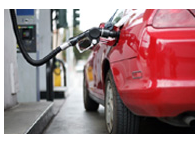By Mac Moore
KU Statehouse Wire Service
TOPEKA— With Gov. Sam Brownback’s budget plan set to use $500 million of Kansas Department of Transportation funds to fill budget shortfalls in each of the next two fiscal years, the Senate Assessment and Taxation committee heard a motor fuel tax bill last week that would replace $84.5 million of those transferred funds.
Senate Bill 224 would increase the motor fuel tax rate to 29 cents per gallon. The 5-cent increase would make Kansas higher than each border state. Nebraska is currently the highest with a 28-cent rate for gas. Missouri and Oklahoma have 17-cent rate while Colorado is 22.
Jerry Younger, managing director of Kansas Ready Mixed Concrete Association and former KDOT official, said the tax was necessary to start addressing the neglect toward Kansas road infrastructure. Younger said the investments last year and this year are far short of the necessary $380 million required just to maintain the Kansas Highway system and the state’s budget transfers indefinitely delayed $500 million worth of KDOT projects.
“If four consecutive years of not fully funding the basic preservation needs occur, two things will most certainly happen,” Younger said. “Highways and bridges will be in worse condition than they are today and it will cost significantly more to address the roads and bridges that fall out of good condition.”
According to a 2016 U.S. Department of Transportation report, 62 percent of Kansas roads are considered to be in poor or mediocre conditions, ranked 38th in the nation. Thirty-one percent of Missouri’s roads are in poor condidtion.
Tom Palace, executive director of the Petroleum Marketers and Convenience Store Association of Kansas, said the bill puts Kansas convenience store owners at a disadvantage compared to neighboring states. Palace said nearly 38 percent of the Kansas population lives in the first county off the border. He said current tax levels on gas, as well as tobacco, incentivize customers to cross the border to make convenience store purchases.
“Consumers won’t change what they buy,” Palace said. “They will change where they buy. They will simply find a cheaper way to purchase their goods.”
Tom Whitaker, executive director of the Kansas Motor Carriers Association, said the trucking industry cannot afford this tax increase. Whitaker said the industry already bears a high burden of road maintenance costs, including a $100 per year increase on vehicle registration fees for trucks larger than a pickup truck. He said the transfers to the general fund should be fixed before discussing an increase to motor fuel taxes.
“We ask you to stop depending on the Bank of KDOT,” Whitaker said. “The Governor and the legislature do not have a State Highway Fund problem, you have a State General Fund problem.”
Under the bill, the State Highway Fund is estimated to receive $56.1 million in FY 2018 and $61.3 million in FY 2019.
All additional funds would be allocated to the Special City County Highway Fund. The SCCHF is estimated to increase by $28.4 million in FY 2018.
Kansas is currently projected to take in $439 million in motor fuel taxes in Fiscal Year 2017.
The Senate committee took no action on the bill.
Mac Moore is a University of Kansas senior journalism major from Lawrence.
